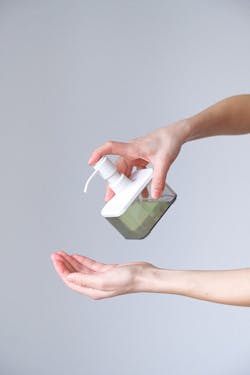The Federal Food and Drug Administration (FDA) took three regulatory actions designed to increase the supply of alcohol-based hand sanitizers, hydroxychloroquine and chloroquine phosphate, as well as respirators, the agency said in a news release.
The actions are intended to be place temporarily during the COVID-19 pandemic.
First, the agency issued a guidance file:///C:/Users/lwilson/Downloads/Temporary_Policy_for_Manufacture_of_Alcohol_for_Incorporation_Into_Alcohol-Based_Hand_Sanitizer_Products_During_the_Public_Health_Emergency_(COVID-19)%20(2).pdf aimed at hand sanitizers. FDA officials laid out rules for the use of ethanol, also known as ethyl alcohol, the base ingredient in many alcoholic beverages, as an active pharmaceutical ingredient in alcohol-based hand sanitizers.
In the guidance, the FDA stipulated that the alcohol must be at least 94.9 percent ethanol by volume and be denatured, a process of adding ingredients to make the alcohol undrinkable. The FDA also said that water used to formulate the product must be sterile.
In a second action https://www.fda.gov/media/94402/download, the FDA added hydroxychloroquine sulfate to category 1 under the Interim Policy on Compounding Using Bulk Drug Substances Under Section 503B of the Federal Food, Drug, and Cosmetic Act. The FDA said “it does not intend to object to registered outsourcing facilities using hydroxychloroquine (or chloroquine phosphate, which was already on category 1), to compound human drugs provided the drugs meet other conditions and requirements in the FD&C Act.”
Both hydroxychloroquine and chloroquine phosphate, which are typically used to treat malaria, have been cited as potential treatments for the symptoms COVID-19. The drugs also are used to treat certain autoimmune diseases.
The FDA described compounding as a “practice in which a licensed pharmacist, a licensed physician, or, in the case of an outsourcing facility, a person under the supervision of a licensed pharmacist, combines, mixes, or alters ingredients of a drug to create a medication tailored to the needs of an individual patient.”
In the third action https://www.fda.gov/media/136423/download, the FDA issued an emergency use authorization (EUA) for ventilators, anesthesia gas machines modified for use as ventilators, and positive pressure breathing devices modified for use as ventilators, ventilator tubing connectors and ventilator accessories. The action allows manufacturers to submit a request to the FDA to have their devices added to the EUA list for use during the COVID-19 pandemic.

